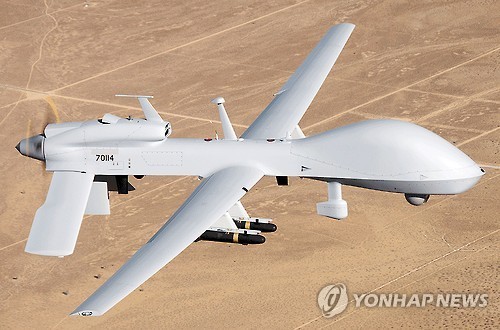The US plan to deploy a military drone in South Korea is part of efforts to bolster defenses for the Asian ally and American interests against North Korean threats in addition to the THAAD missile defense system, the State Department said Monday.
State Department acting spokesman Mark Toner made the remark, confirming Yonhap News Agency's report that the US Army plans to permanently station a Gray Eagle unmanned aerial system company at Gunsan Air Base in South Korea to enhance its strike capabilities against ground targets in North Korea.
 |
MQ-1C Gray Eagle (Yonhap) |
"This is, I think, an ongoing effort to defend the Republic of Korea and US interests in order to maintain regional security, stability and economic prosperity for the region. In addition to THAAD ... these are defensive measures that are a response to what we ... view as a real and credible threat to our security," Toner said.
"These are very clearly defensive measures that we're taking in response to an increasingly worrying, concerning threat from North Korea. China understands that threat. They're not oblivious to what's happening in North Korea with, again, the pace of the testing that's been going on over the past six months," he said.
China has railed against the deployment of a THAAD battery, claiming the system, especially its powerful radar, could be used to spy on the country and undermine its nuclear deterrent, despite repeated assurances from Washington that the battery is designed only to defend against North Korean threats.
The issue will be a topic for Secretary of State Rex Tillerson's upcoming trip to Beijing, Toner said.
"I think part of, obviously, the discussions he's going to have when he's in Beijing are hopefully going to be geared toward easing some of those concerns but also in making very clear that we're taking these actions in an effort to deal with an increasing threat and that we have to do more, we have to look at new ideas, new ways of dealing with North Korea," he said.
"So we understand there's -- everybody agrees on the challenge, which is: How do you stop North Korea's bad behavior? There's many ways to look at the problem, many ways to address it. I think part of this trip will be about trying to hone in on some next steps." (Yonhap)






![[Exclusive] Hyundai Mobis eyes closer ties with BYD](http://res.heraldm.com/phpwas/restmb_idxmake.php?idx=644&simg=/content/image/2024/11/25/20241125050044_0.jpg)
![[Herald Review] 'Gangnam B-Side' combines social realism with masterful suspense, performance](http://res.heraldm.com/phpwas/restmb_idxmake.php?idx=644&simg=/content/image/2024/11/25/20241125050072_0.jpg)
![[Herald Interview] 'Trump will use tariffs as first line of defense for American manufacturing'](http://res.heraldm.com/phpwas/restmb_idxmake.php?idx=644&simg=/content/image/2024/11/26/20241126050017_0.jpg)